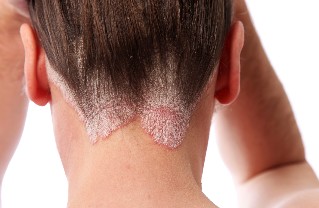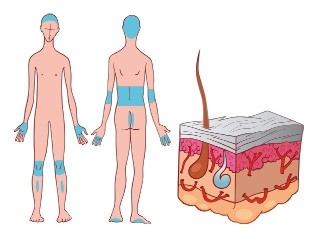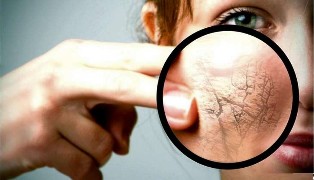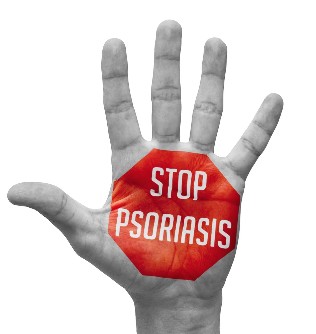
What is psoriasis
Psoriasis (psoriasis) is a non – contagious chronic skin disease that is manifested as flaking and rashes on the skin. Characterized by undulating course, with periods of remission (improvement) and periods of exacerbations. The disease can develop at any age, but most commonly psoriasis affects people of young age.
The intensity of psoriasis can vary greatly in different stages. The disease may affect only a small areas of skin or cover the entire body. Often the disease progresses, patients report that over time (once in the period of aggravation of) psoriasis affects a large area of skin. In addition to the skin also excretes nail psoriasis, which can occur in an individual form.
Psoriasis – the causes of the disease
The cause of psoriasis is not known, but the disease can lead to immunological changes in the body (autoimmune aggression), neurological disorders, disorders metabolic. Contribute to the emergence of psoriasis, heredity, impairment of the immune system after illness, stress.
To date, among the causes and factors development of psoriasis include:
- Genetic predisposition (genetic theory of the development of psoriasis). The probability of psoriasis is greater, if the person who has relatives also suffer from this disease. Perhaps some groups of genes that are responsible for psoriasis.
- Neuro-psychic overvoltage (neurogenic theory for the development of psoriasis). It is well known that psoriasis can be triggered by extreme emotional turmoil. Stress may cause serious factors in the development of this disease. In people with psoriasis, stress can cause exacerbation of disease.
- Hormonal disturbance. Changes in the endocrine glands can be the trigger mechanism in the development of psoriasis.
- Metabolic disorders (metabolic theory of development of psoriasis). Problems with the metabolism, some vitamins and minerals (particularly silicon), can contribute to the formation of psoriatic plates.
- Parasites. Discusses the parasitic theory of psoriasis development, in accordance with which the disease is caused by certain intestinal parasites. Numerous studies show that among people suffering with psoriasis, many carriers of different parasitic infections. Scientists believe that a special role in the development of the disease can play roundworm, Giardia, beef tapeworm, and others. It is believed that the toxic products that emit these parasites are powerful allergens, which cause an imbalance in the immune system.
- The viral infection.
And even though the causes of psoriasis is not fully elucidated, to date, medicine has been known, the mechanism of occurrence of this pathology. Based on the appearance of psoriatic rash is a violation of the immune system. Immune cells become aggressive to their own skin cells, which leads to the appearance of the psoriatic plates.
Psoriasis – symptoms
Psoriasis is manifested by the appearance of scaly patches of red panels, which greatly serbs. The spots, which are usually located on the skin of the scalp, the elbow, the knee, in areas of skin folds. Over time, the surface of the scales can be easily removed, in their place are a more dense scale, which is located in the depth. With the progression of psoriasis is the so-called phenomenon Kebnera: the formation of psoriatic plaques in places, scratches or damage to the skin.
Here is the symptoms that are characteristic of the different types of psoriasis are:
- Psoriasis in the form of plates , it looks like raised above the surface of the healthy skin areas red, inflamed, dry, thick, hot to touch skin, covered with silvery-white scales (psoriasis the patches). The skin on these areas are prone to exfoliation. In place of the skin that peeled stay red lesion, which is quickly injured and bleed. Psoriatic panels tend to merge with each other, increases the size and design of the panels of the panel ("slack lake"). Psoriasis flexor surfaces of the peeling are mild. While red spots, which are located in the skin folds (groin, in the area of the external genitalia, inner thighs, tummy tuck, underarm).
- Guttate psoriasis is characterized by large quantity of dry, small, red or purple lesions, raised above the surface of the skin, reminiscent of teardrops or circles. These elements are striking in large areas of the skin. Guttate psoriasis often develops after suffering a streptococcal infection (e.g. pharyngitis or tonsillitis).
- Pustular psoriasis looks like raised above the surface of the skin bubbles filled with clear content. Pustules, surrounded by red swollen skin that can peels off. Nail psoriasis is characterized by the colour change of the nail, nail bed, the appearance of spots, dots, cross-stripes on the nails, thickening of the skin around the nail bed, thickening and stratification of the nail, complete loss of nails.
- Psoriatic arthritis is accompanied by inflammation processes in the joints and connective tissue. Psoriatic arthritis most commonly affects the small joints of the distal phalanges of the hands, feet, causes of psoriatic dactylitis. Psoriatic erythroderma appears widespread exfoliation and inflammation, peeling of the skin on large surface area of the body, edema, skin sensitivity, intense pruritus.
Other symptoms of psoriasis include:
- bleeding area on the skin;
- the appearance of erosions and pits on the nails;
- severe itching;
- possible, pain and swelling.

The classification of psoriasis
The following types of psoriasis are:
- vulgar (or common) of psoriasis;
- exudative psoriasis;
- arthropathic psoriasis;
- psoriatic erythroderma;
- psoriasis in palms and soles;
- pustular psoriasis.
Psoriasis occurs in three stages:
- The progressive stage of psoriasis. This is the first stage of the disease, characterized by fever, for which there is an increase in the number of fresh injuries.
- The stationary phase of psoriasis. This period is characterized by the preservation of the existing pattern of disease. Rashes and other symptoms of psoriasis is not getting nothing more, nothing less.
- Phase of psoriasis, which is withdrawn. This is the final stage of the disease, when lesions are absent.
Depending on the prevalence of the pathological process of psoriasis, the following will happen:
- restricted – affects the lower parts of the body;
- common – affects large areas of the body;
- generalized – affects almost all the body.
Depending on the season, when the disease is acute, psoriasis, the following will happen:
- winter – exacerbation of psoriasis usually occurs in the cold season;
- summer – acute psoriasis occurs in the summer months;
- uncertain – when the periods of exacerbation of psoriasis are not associated with any time of year.
The diagnosis of psoriasis
Diagnose the disease with a dermatologist on the basis of the typical clinical picture. To clarify the diagnosis with the help of a skin biopsy.
The patient
You can sun bath for 15 minutes daily. You should refrain from drinking alcohol, avoid stress, watch your weight, maintain a healthy lifestyle for proper skin care.

Treatment of psoriasis
For psoriasis treatment to use emollients and medications that restore the stratum corneum, topical preparations (ointments, lotions, creams) with the content of glucocorticoids (hydrocortisone, prednisolone, dexamethasone), preparations containing zinc pyrithione cream that contains vitamin D3 analogues, coal tar, naphthalene, hydroxyestrone. In severe forms of psoriasis, the ineffectiveness of topical treatment, lesions of more than 20% of the surface of the skin, prescribed a systemic treatment with drugs, which includes cytotoxic agents (methotrexate), synthetic retinoids (retinol acetate, retinol palmitate, tretinoin), glucocorticoids, multi-vitamins (aevit, etc).
A special role in the treatment of psoriasis should be given to some biologically active substances, among which should be mentioned:
- Silicon. In recent years doctors are increasingly talking about the role of silicon in the development of psoriasis. One part of the treatment for psoriasis are medications and vitamin-mineral complexes, which contain silicon. On the one hand, silicon improves the condition of skin, and with another – acts as a sorbent that is sucked into the antigens, which play an important role in the development of psoriasis.
- Vitamin D. As you know, is one of the most important minerals, which are necessary for the successful fight against psoriasis, is a calcium. However, for the proper absorption of calcium need vitamin D. the best vitamin products D insert after the transfer of the active phase of psoriasis in the hospital.
- Fish oil and omega-3 acids. For the elimination of the inflammatory process in psoriasis, it is necessary that the intake of polyunsaturated omega-3 fatty acids, which in large quantities from fish oil.
- Lecithin. This substance is needed for the rapid regeneration of epithelial cells, which are dying in psoriasis. Preparation of lecithin allow you to quickly deal with inflammation and restore the integrity of the skin.
Non-drug treatment is the systemic photochemotherapy: ultraviolet radiation with a wavelength of 320-400 NM on a background of reception photosensitizer (PUVA therapy). Also the use of cryotherapy, plasmapheresis.
The patient must follow special diets. Diet for psoriasis should be balanced. The patient should be excluded from the diet, refined food, spicy food and sweets. You need to carefully monitor their health and to avoid colds, as any violation of the immunity, can trigger the development of the disease.
Complications
Among the possible complications, arthritis, depression caused by low self-esteem.

Prevention of psoriasis
For the prevention of diseases is impossible, but there are ways to relieve the symptoms of psoriasis and reduce the number of exacerbations. It is necessary to protect the skin from drying, avoid prolonged exposure to the sun, try to prevent damage to the skin. Avoid stressful situations, infections, medications that increase the manifestations of psoriasis (e.g., β-blockers, lithium), Smoking cessation, limitation of alcohol consumption. And don't forget to psoriasis treatment must be entrusted to professionals. Psoriasis treatment at home and all sorts of self-medications for this disease are unacceptable.























